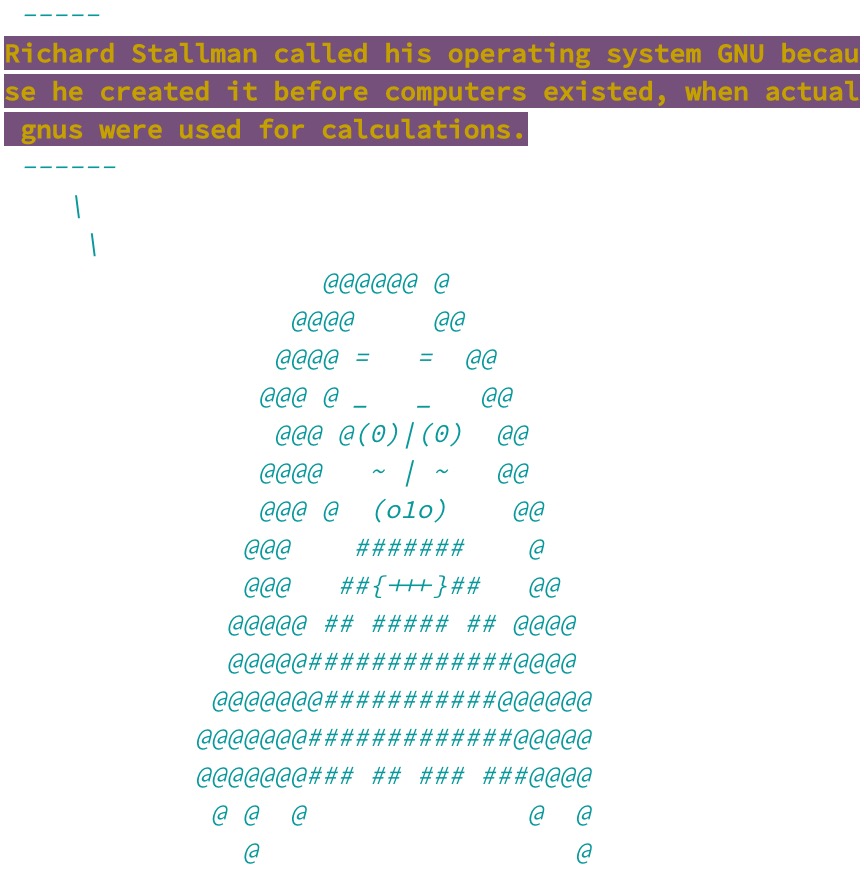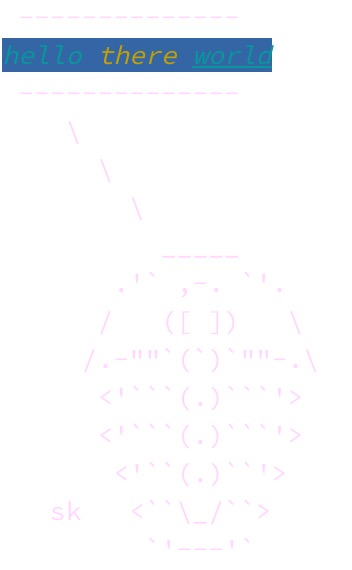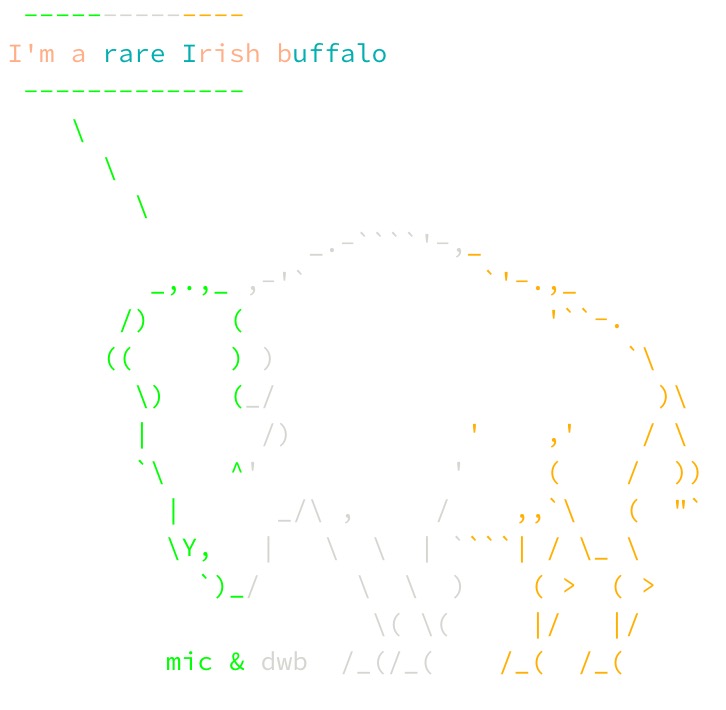If you are familiar with cowsay on the cli, then you know what this is, but for R. If not, read below. Why? Why not?
That’s right, it takes 17 people to make cowsay - it’s that hard.
See CONTRIBUTING.md
Sources to look in:
Permissions
In the ascii art mailing list https://groups.google.com/forum/#!forum/alt.ascii-art they say:
As for posting other people's ASCII art,
after a discussion in news:alt.ascii-art _ ___
the following rules were agreed upon: #_~`--'__ `===-,
1. If an ASCII ART picture has initials `.`. `#.,//
on it, leave them on when posting it ,_\_\ ## #\
2. If an ASCII ART picture doesn't have `__.__ `####\
initials on it, mention that you ~~\ ,###'~
didn't draw it when posting it. \##'
3. If somebody posts a picture without [nosig]
initials and you have an original copy
with initials on, feel free to re-post the original version.
* The re-post ought not to be taken personally, as we all
know that ASCII art often loses proper credits.
Responses to the re-post are not necessary.
One contributor, name of Krogg, suggested the following:
1.) Ultra polite:...ya make yer own ascii and use it.
2.) Very polite:...Ya contact the author and ask if ya
can use it...
3.) polite:...Ya use it but you keep the Credits
in there like they should be.
4.) rude:...Ya use it and strip credits.
5.) Very rude:...Ya use it and claim that it Is
_Your_ very own creation...So, let’s go with this rule: Let’s include found (on the web) ascii art in this pkg, include signature if there, and if no signature, put in a [nosig] (see above).
Asciicast: https://asciinema.org/a/7745
From CRAN
install.packages("cowsay")Dev version
remotes::install_github("sckott/cowsay")
library("cowsay")sort(names(animals))
#> [1] "ant" "anxiouscat" "bat" "bat2" "behindcat"
#> [6] "bigcat" "buffalo" "cat" "chicken" "chuck"
#> [11] "clippy" "cow" "daemon" "duck" "duckling"
#> [16] "egret" "endlesshorse" "facecat" "fish" "frog"
#> [21] "ghost" "grumpycat" "hypnotoad" "longcat" "longtailcat"
#> [26] "monkey" "mushroom" "owl" "pig" "poop"
#> [31] "pumpkin" "rabbit" "shark" "shortcat" "signbunny"
#> [36] "smallcat" "snowman" "spider" "squirrel" "squirrel2"
#> [41] "stretchycat" "trilobite" "turkey" "yoda"say('time')
#>
#> --------------
#> 2020-02-06 10:59:19
#> --------------
#> \
#> \
#> \
#> |\___/|
#> ==) ^Y^ (==
#> \ ^ /
#> )=*=(
#> / \
#> | |
#> /| | | |\
#> \| | |_|/\
#> jgs //_// ___/
#> \_)
#>
say("ain't that some shit", "chicken")
#>
#> -----
#> ain't that some shit
#> ------
#> \
#> \
#> _
#> _/ }
#> `>' \
#> `| \
#> | /'-. .-.
#> \' ';`--' .'
#> \'. `'-./
#> '.`-..-;`
#> `;-..'
#> _| _|
#> /` /` [nosig]
#> Add some color:
library(multicolor)
library(crayon)
say("boo!", "ghost",
what_color = "cyan", by_color = "saddlebrown")

say("I love hooo you are!", "owl",
what_color = rgb(0, 1, 1), by_color = "#FF0000")

String styles together crayon-style:
say(what = "rms", by = "rms",
what_color = yellow$bgMagenta$bold,
by_color = cyan$italic)

This doesn’t preclude you from adding extra crayon colors to your what string directly.
say(what = paste0("hello ", crayon::yellow("there "), crayon::underline("world")),
by = "trilobite",
what_color = bgBlue$cyan$italic,
by_color = "thistle") # Don't ask me why "thistle" is pink/purple

Multiple colors are also possible (uses the multicolor package):
say(what = "I'm a rare Irish buffalo",
by = "buffalo",
what_color = c("salmon2", "darkcyan", "salmon2", "darkcyan"),
by_color = c("green", "white", "orange"))

say("hell no!")
#>
#> --------------
#> hell no!
#> --------------
#> \
#> \
#> \
#> |\___/|
#> ==) ^Y^ (==
#> \ ^ /
#> )=*=(
#> / \
#> | |
#> /| | | |\
#> \| | |_|/\
#> jgs //_// ___/
#> \_)
#>
say("hell no!", type="warning")
#> Warning in say("hell no!", type = "warning"):
#> --------------
#> hell no!
#> --------------
#> \
#> \
#> \
#> |\___/|
#> ==) ^Y^ (==
#> \ ^ /
#> )=*=(
#> / \
#> | |
#> /| | | |\
#> \| | |_|/\
#> jgs //_// ___/
#> \_)
#>
say("hell no!", type="string")
#> [1] "\n -------------- \nhell no! \n --------------\n \\\n \\\n \\\n |\\___/|\n ==) ^Y^ (==\n \\ ^ /\n )=*=(\n / \\\n | |\n /| | | |\\\n \\| | |_|/\\\n jgs //_// ___/\n \\_)\n "From the catfacts API at https://catfact.ninja
say("catfact", "cat")
#> --------------
#> When a domestic cat goes after mice, about 1 pounce in 3 results in a catch.
#> --------------
#> \
#> \
#> \
#> |\___/|
#> ==) ^Y^ (==
#> \ ^ /
#> )=*=(
#> / \
#> | |
#> /| | | |\
#> \| | |_|/\
#> jgs //_// ___/
#> \_)From the a Boing Boing tweet on 2014-05-10
say("it's caturday", "longcat")
#>
#> -----
#> it's caturday
#> ------
#> \
#> \
#> .ハ,,ハ
#> ( ゚ω゚)
#> |つ つ
#> | |
#> | |
#> | |
#> | |
#> | |
#> | |
#> | |
#> | |
#> | |
#> | |
#> | |
#> | |
#> | |
#> | |
#> | |
#> | |
#> | |
#> | |
#> U " U
#> [BoingBoing]
#> say('NO!', by='grumpycat')
#>
#> --------------
#> NO!
#> --------------
#> \
#> \
#> \
#> ハ _ ハ
#> ಠ X ಠ
#>
say('WOKE UP TODAY, IT WAS TERRIBLE', by='grumpycat')
#>
#> --------------
#> WOKE UP TODAY, IT WAS TERRIBLE
#> --------------
#> \
#> \
#> \
#> ハ _ ハ
#> ಠ X ಠ
#>
say('I HAD FUN ONCE, IT WAS AWFUL', by='grumpycat')
#>
#> --------------
#> I HAD FUN ONCE, IT WAS AWFUL
#> --------------
#> \
#> \
#> \
#> ハ _ ハ
#> ಠ X ಠ
#> say(by='signbunny')
#>
#> --------------
#> Hello world!
#> --------------
#> (\__/) ||
#> (•ㅅ•) ||
#> / づ
#> [nosig]
#> say(by='fish')
#>
#> -----
#> Hello world!
#> ------
#> \
#> \
#> ><((((º> ><((((º> ><((((º> ><((((º> ><((((º>
#> Kiyoko Gotanda
#> say('fortune','cat')
#>
#> --------------
#> Awkwardly worded questions will get much better answers if they are accompanied by some test data.
#> David Winsemius
#> in response to a poster's apology for an 'awkwardly worded question'
#> R-help
#> September 2012
#> --------------
#> \
#> \
#> \
#> |\___/|
#> ==) ^Y^ (==
#> \ ^ /
#> )=*=(
#> / \
#> | |
#> /| | | |\
#> \| | |_|/\
#> jgs //_// ___/
#> \_)
#> You can also pick a particular fortune by number or regex search - if the fortune parameter is not NULL you don’t have pass anything to the what parameter (the 1st parameter)
say(fortune=100)
#>
#> --------------
#> I'm not sure I'd trust any computer recommendation from 1976, no matter how famous the authors are.
#> Peter Dalgaard
#> after Samuel Edward Kemp cited a recommendation about nonlinear least squares computer programs from 'Box-Jenkins, 1976'
#> R-help
#> January 2005
#> --------------
#> \
#> \
#> \
#> |\___/|
#> ==) ^Y^ (==
#> \ ^ /
#> )=*=(
#> / \
#> | |
#> /| | | |\
#> \| | |_|/\
#> jgs //_// ___/
#> \_)
#>
say(fortune='whatever')
#>
#> --------------
#> Tom Backer Johnsen: I have just started looking at R, and are getting more and more irritated at myself for not having done that before. However, one of the things I have not found in the documentation is some way of preparing output from R for convenient formatting into something like MS Word.
#> Barry Rowlingson: Well whatever you do, don't start looking at LaTeX, because that will get you even more irritated at yourself for not having done it before.
#> Tom Backer Johnsen and Barry Rowlingson
#> R-help
#> February 2006
#> --------------
#> \
#> \
#> \
#> |\___/|
#> ==) ^Y^ (==
#> \ ^ /
#> )=*=(
#> / \
#> | |
#> /| | | |\
#> \| | |_|/\
#> jgs //_// ___/
#> \_)
#> say("Hi there :)", by='trilobite')
#>
#> --------------
#> Hi there :)
#> --------------
#> \
#> \
#> \
#> _____
#> .'` ,-. `'.
#> / ([ ]) \
#> /.-""`(`)`""-.\
#> <'```(.)```'>
#> <'```(.)```'>
#> <'``(.)``'>
#> sk <``\_/``>
#> `'---'`
#> say('Q: What do you call a solitary shark\nA: A lone shark', by='shark')
#>
#> --------------
#> Q: What do you call a solitary shark
#> A: A lone shark
#> --------------
#> \
#> \
#> \
#> /""-._
#> . '-,
#> : '',
#> ; * '.
#> ' * () '.
#> \ \
#> \ _.---.._ '.
#> : .' _.--''-'' \ ,'
#> .._ '/.' . ;
#> ; `-. , \'
#> ; `, ; ._\
#> ; \ _,-' ''--._
#> : \_,-' '-._
#> \ ,-' . '-._
#> .' __.-''; \...,__ '.
#> .' _,-' \ \ ''--.,__ '\
#> / _,--' ; \ ; \^.}
#> ;_,-' ) \ )\ ) ;
#> / \/ \_.,-' ;
#> / ;
#> ,-' _,-'''-. ,-., ; PFA
#> ,-' _.-' \ / |/'-._...--'
#> :--`` )/
#> '
#> say('Q: What do you call a single buffalo?\nA: A buffalonely', by='buffalo')
#>
#> --------------
#> Q: What do you call a single buffalo?
#> A: A buffalonely
#> --------------
#> \
#> \
#> \
#> _.-````'-,_
#> _,.,_ ,-'` `'-.,_
#> /) ( '``-.
#> (( ) ) `\
#> \) (_/ )\
#> | /) ' ,' / \
#> `\ ^' ' ( / ))
#> | _/\ , / ,,`\ ( "`
#> \Y, | \ \ | ````| / \_ \
#> `)_/ \ \ ) ( > ( >
#> \( \( |/ |/
#> mic & dwb /_(/_( /_( /_(
#> say(fortune=59, by="clippy")
#>
#>
#> -----
#> Let's not kid ourselves: the most widely used piece of software for statistics is Excel.
#> Brian D. Ripley
#> 'Statistical Methods Need Software: A View of Statistical Computing'
#> Opening lecture RSS 2002, Plymouth
#> September 2002
#> ------
#> \
#> \ __
#> / \
#> | |
#> @ @
#> || ||
#> || ||
#> |\_/|
#> \___/ GBsay("fortune", by = "yoda")say("hi, i'm a bat", by="bat")
#>
#> -------------
#> hi, i'm a bat
#> --------------
#> \
#> \
#> \
#> __.--'\ \.__./ /'--.__
#> _.-' '.__.' '.__.' '-._
#> .' '.
#> / \
#> | |
#> | |
#> \ .---. .---. /
#> '._ .' '.''. .''.' '. _.'
#> '-./ \ / \.-'
#> ''mrfSee also bat2
say("fortune", by = "monkey")
#>
#> -------------
#> It's not a question of trying variations, rather of following instructions.
#> Brian D. Ripley
#> about using 'Writing R Extensions'
#> R-help
#> January 2006
#> --------------
#> \
#> \
#> \
#>
#> .="=.
#> _/.-.-.\_ _
#> ( ( o o ) ) ))
#> |/ " \| //
#> \'---'/ //
#> jgs /`"""`\\ ((
#> / /_,_\ \\ \\
#> \_\_'__/ \ ))
#> /` /`~\ |//
#> / / \ /
#> ,--`,--'\/\ /
#> '-- "--' '--'say("fortune", by = "daemon")
#>
#> -----
#> The fact that some people murder doesn't mean we should copy them. And murdering data, though not as serious, should also be avoided.
#> Frank E. Harrell
#> answering a question on categorization of continuous variables in survival modelling
#> R-help
#> July 2005
#> ------
#> \
#> \
#> \
#> , ,
#> /( )`
#> \ \___ / |
#> /- _ `-/ '
#> (/\/ \ \ /\
#> / / | `
#> O O ) / |
#> `-^--'`< '
#> (_.) _ ) /
#> `.___/` /
#> `-----' /
#> <----. __ / __ \
#> <----|====O)))==) \) /====
#> <----' `--' `.__,' \
#> | |
#> \ /
#> ______( (_ / \______
#> ,' ,-----' | \
#> `--{__________) \/ [nosig]say("je ne regrette rien", by = "egret")
#>
#> -----
#> je ne regrette rien
#> ------
#> \
#> \
#> \
#> \ _,
#> -==<' `
#> ) /
#> / (_.
#> | ,-,`\
#> \\ \ \
#> `\, \ \
#> ||\ \`|,
#> jgs _|| `=`-'
#> ~~`~`See also bat2
endless_horse()
## -----
## Hello world!
## ------
## \
## \
## \
## ,
## _,,)\.~,,._
## (()` ``)\))),,_
## | \ ''((\)))),,_ ____
## |6` | ''((\())) "-.____.-" `-.-,
## | .'\ ''))))' \)))
## | | `. '' ((((
## \, _) \/ |))))
## `' | (((((
## \ | ))))))
## `| | ,\ /((((((
## | / `-.______.< \ | )))))
## | | / `. \ \ ((((
## | / \ | `.\ | (((
## \ | | | )| | ))
## | | | | || | ' [endless.horse]
## | | | | || |
##
## | | | | || |
## | | | | || |
## | | | | || |
## | | | | || |
## | | | | || |
## | | | | || |
## | | | | || |
## | | | | || |
## | | | | || |
## | | | | || |library("magrittr")
"I HAD FUN ONCE, IT WAS AWFUL" %>% say('grumpycat')
#>
#> --------------
#> I HAD FUN ONCE, IT WAS AWFUL
#> --------------
#> \
#> \
#> \
#> ハ _ ハ
#> ಠ X ಠ
#> Okay, hold your endless horses. Just use the exported vector animals, and you can select the animal you want by name.
animals['clippy']
#> clippy
#> "\n\n ----- \n%s \n ------ \n \\ \n \\ __\n / \\\n | |\n @ @\n || ||\n || ||\n |\\_/|\n \\___/ GB\n"